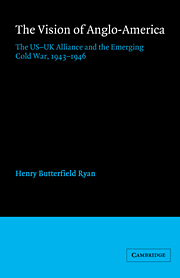INTRODUCTION
Published online by Cambridge University Press: 07 December 2009
Summary
Awaking one night ‘with a sharp stab of almost physical pain’, Winston Churchill realised that he might be dismissed as Prime Minister by Britain's voters in the summer of 1945. Brooding, he said ‘The power to shape the future would be denied me. The knowledge and experience I had gathered, the authority and goodwill I had gained in so many countries, would vanish.’ But, in fact, even after his defeat at the polls, his influence on world affairs was far from spent. If his credit at home was limited for the time being, it remained vast in the United States, the largest unit of the English-speaking peoples, a community of which he often spoke, exaggerating its cohesiveness.
The extent of his prestige in America was never clearer than when he delivered his ‘Iron Curtain’ speech in Fulton, Missouri, on 5 March 1946. On that occasion he was not simply warning the world of the danger of communism or of Soviet imperialism, or trying to stimulate the West to more appropriate policies. He was continuing an effort made since he had become Prime Minister to join Great Britain and the United States, at least their military and foreign policy directorates, in a much closer union. By the time of his defeat the previous July he had not succeeded, and at Fulton he made a last attempt.
Churchill and the government he headed were determined to maintain a relationship with the United States unique among modern sovereign powers.
- Type
- Chapter
- Information
- The Vision of Anglo-AmericaThe US-UK Alliance and the Emerging Cold War, 1943–1946, pp. 1 - 12Publisher: Cambridge University PressPrint publication year: 1987

